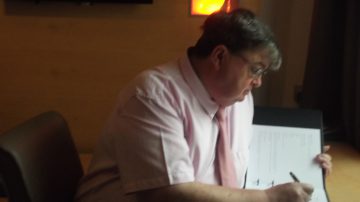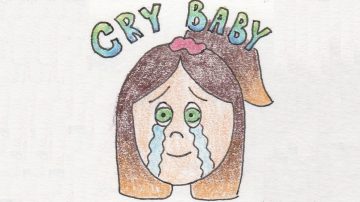Hannah’s story
Age: 30
I became depressed in my early teens when I was looking after my mum who was suffering from mental health difficulties. She committed suicide when I was 21.
I was her carer and had to look after my younger brother too whilst my dad was away. I spent a lot of time (with my dad) fighting getting help for her. It was really difficult to get her a bed in hospital, for example, and the community health care workers struggled to come out to see her. I had no support.
I remember once she took an overdose and I rang the ambulance, when they arrived they asked my mum if she had an overdose and she said no. Of course she would say no! They were nearly convinced that my mum was ok. I insisted they should take my mum to hospital. They reluctantly accepted but didn’t even help my mum to walk to the ambulance so I had to help her and when she fell back onto me they didn’t seem to care and left me to get her in by myself. In the ambulance, one of the female staff told my mum what a selfish, horrible person she was. It was the worst thing to say to her in that situation.
After when my mum was transferred to a mental health ward, for weeks and weeks, she kept saying, ‘Hannah I am such a selfish horrible person, I’m so sorry.’ She was fixated on it. I put a formal complaint against the paramedic, I didn’t want her to lose her job but they needed to educate them on how to talk to someone who has got mental health issues and how to deal with them, because it was absolutely inappropriate.
My mum wasn’t selfish, she believed we were better off without her and she saw it as a selfless act. In her suicide note she wrote, ‘I hope you have a better life without me.’ We had been telling them (the services) my mum was really ill for a long time but they didn’t listen. When my dad was away, I used to sleep in the same bed with her to keep an eye on her to make sure she didn’t do anything when I was asleep. My dad slept with his back to the door on the floor so she wouldn’t leave. After each suicide attempt they sent my mum home because she said she was fine and they just discharged her based on that but only my dad and I knew she was seriously ill. We were never listened to.
As a child having to live with the instability of my mother’s illness and being in a caring role meant I often acted out, struggled, developed eating issues, and was scared to go to school for fear of leaving her alone. This was misinterpreted as ‘behaviour issues’, as I was told I was making things worse, which was the opposite of why I was behaving that way. In my teens my anxiety got worse and I started having lots of panic attacks and depression it was again misinterpreted as ‘behaviour issues’. I was always blamed for making life difficult for others which wasn’t a helpful thing to hear as a teenager. My introduction to mental health services started, when I was young in a family therapy session where everyone ganged up on me blaming me, despite everyone knowing the real issue was my mum’s health, but it was making this worse, there was no focus on me, I was a child. I was told it was my fault my mum was ill because I made life difficult for her by not behaving. I wasn’t supported, didn’t really get any support from school or anywhere else, no one cared or helped me and it made me quite self-destructive.
I talked to my doctors, but it was very difficult to get the help I needed. I was so self aware, based on my own experience and tried to manage my mental health because I knew it takes a long time to get help.
When I was 17, I decided to move out of my parents home and worked as a support worker at Northern General. I realised my reaction to the environment was important in realising my mental health because at that time I wasn’t looking after my mum and I became more aware of my own growing anxiety and struggles, linked to the hospital which held many difficult memories for me.
At the age of 18 I became very sick with depression for a long period. I just lied down in bed and didn’t really eat anything, didn’t engage with anything. I saw my GP every time and they sent me off with antidepressants and left me to it. It didn’t go much further than that at that time.
My next job was at selling jewellery where they treated me very badly, I had a breakdown when I was working there. At that time I was back with my mum and our kind of mental health rubbed off on each other negatively. I started developing quite uncontrollable bad OCD (Obsessive Compulsive Disorder) behaviour. For example, I was convinced I chucked things in the bin and I checked the bins all the time and started self-harming. It escalated and I ended up being completely house-bound. I just left the house for CBT (Cognitive Behavioural Therapy) or counselling and was on different medication. I didn’t find CBT helpful to be honest. I think they didn’t take me seriously and it was just the tick box exercise. Yet, despite being housebound for 8 months I wasn’t taken seriously. This has a devastating impact on mine and my mum’s mental health.
After a long period of sickness, between two jobs, I tried to get some disability support, but I was told I wasn’t qualified. I thought I wasn’t worthy of the support, that I wasn’t poorly enough. They didn’t help me or support me. I had to rely on my partner but it wasn’t a healthy relationship. I struggled in silence for a long time because I didn’t want to bother people.
Over the years I had panic attacks while driving so chose to stop driving because it was quite dangerous. I had 2 suicide attempts and ended up at the A&E. I think one of the reasons I didn’t get as much help as I needed was because my mum was being so ill and suicidal, having been sectioned many times, and had multiple intensive care stays. I was adamant that I won’t be like her, I won’t kill myself. I decided not to tick the suicide box, so I wasn’t taken seriously.
My mum killed herself just two weeks after my 21st birthday. All my life, my mind had been building up on how to deal with my mum’s suicide, which explained my OCD centred on fear of losing things. Fear of losing things was in fact fear of losing my mum from being a young child. And now that worst thing had happened. Before my mum’s suicide, I didn’t leave the house for 8 months. Then following this realisation of my worst fear enforced by my OCD I was able to escape to America and lived there for a month, I just needed to remove myself completely from everything I’d battled all those years. It meant I was able to clear my head and come back with a fresh outlook.
When I returned I was in good mental health for a while, I stopped taking medication, I did an access course and got into university, but the anxiety which is like a learned behaviour came back only this time in a new form. It wasn’t the OCD side of things, fear of losing stuff, but more like PTSD type (Post-Traumatic Stress Disorder), memories and things triggered me. I couldn’t control what was upsetting me.
I got support from university support services for my mental health which was better than the help I got from public services. I had a mentor and I could talk about my anxieties and get it out of my system. I was managing well for a while. No-one told me I was stupid or irrational.
I still saw my GP and kept getting more CBT and it kept not working. I had tried ALL the things they told me to do, doing exercise, trying everything, but what I needed to do was to address the memories rather than change a ‘behaviour’ to deal with anxiety. I needed help to deal with the trauma and memories which triggered those behaviours, not changing the behaviours.
I needed something more specialist. Most of my anxiety came from hating myself because it went back to when I was a kid and being told it was all my fault. I felt responsible for the death of my mum, that I didn’t manage to keep her alive. I used these memories to beat myself, all the examples of my failures and faults.
I recognised my mental health didn’t respond to counselling and CBTs, I was self-aware. Just because I didn’t tick suicide box, they thought I was managing ok. I knew what the problem was but didn’t get the help I needed.
It was like a cycle, you go to the doctor, they refer you to CBT, give you medication, and then after a while back again to the GP.
I don’t have much trust or faith in the system because of how hard it was to get help for my mum. She committed suicide under NHS care, they had to be held responsible. They failed, their protocols failed, I mean my mum wanted to die, but it was their lack of care and communication that led to it happening.
The two times I attempted suicide and ended up in A&E and each time they sent me home and said someone from the crisis team would phone me and come to talk to me but I never heard from them. They absolutely did nothing. I could have been dead in a ditch. No-one followed it up. It makes you lose faith in the system.
When I scream for help in a corner of my bathroom, nobody knows. If I had the proper support I needed I would be a lot better than I am now. I had to fight to get the help that I needed. The reason I finally ticked the suicide box was when I realised they were not helping me. It made a difference to the support I got. Finally, a year ago, after years and years of fighting and trying to get help, I got referred on from CBT to special psychological services which are based at St George’s. They are really good, a kind of next stage between CBT and psychologic hospitalisation.
Hazel in St George’s was amazing but she was my only contact with the entire team. I have never been able to see a psychiatrist, which I have always felt would have helped me to understand everything about myself better. She offered Compassion-Focused Therapy. She treated me for Complex PTSD, and looked at things I was struggling with. It really helped me. Hazel told me she wasn’t going to do CBT because I had been CBT’d to death!
She was great but she was over-stretched and finally left and I don’t blame her. She told me she was leaving and gave a long notice and suggested she hand my case over to the new person and we have a meeting with 3 of us so I wouldn’t have to tell everything all over again to the new person because it’s so draining. But it didn’t happen because of the covid.
Now there is no one to see me and I am left without anyone and they don’t have any new person and the covid has made it more difficult. Now I am struggling and self-harming again. I contacted my GP to see if she could chase it up and see if I am not forgotten about.
There is a lack of communication within the system. My GP didn’t have any information about my therapy treatment at St George’s, didn’t know my CBT history, didn’t know anything about my suicide hospital admissions. Nothing about the crisis team was reported.
There is little communication between professionals. I think this is why my mother and I hadn’t got the support we needed over the years. For example, when CBT stops or is not going right, no one chases things up. Or when the last time my mother was discharged from hospital she told one of the nurses that she was going to kill herself but the psychologist still discharged her because he thought she was safe to go home but she wasn’t. There is such a disconnect in the system.
I feel like I am lost in the system and no one is following up what is going on. The stupid charts they do to tick boxes on a piece of paper before each session and put you on a scale is ridiculous. My anxiety and depression was always off the scale, despite all of that, I knew until I tick that suicide box (which I didn’t want to tick) I wouldn’t get help. I explained to them why I didn’t tick the box despite being suicidal, because my mum killed herself. I had been terrified as a kid and had very strong feelings about it and literally until 2 years ago I didn’t tick that box. Even my mum didn’t tick that box because she didn’t want people to know she was going to kill herself. She wouldn’t be honest on that form. I wasn’t honest for a long time. They should have listened to her family (me and my dad) because we knew she was seriously ill.
I think they mess up with a lot of people with that because they look ‘fine’ and not suicidal. It’s a big scary thing to tick the suicide box, to tell someone else about that feeling isn’t easy. But I had to tick that box to get help and I think I shouldn’t have to tick that box to get help, but it was actually useful with Hazel at St George’s. Sometimes after the storm is the hardest time. Now my anxiety is attacking everything in my life. Am I still on their list? What’s going on? I need to call St George’s but I sometimes find it quite stressful. I imagine talking to a receptionist and they tell me ‘I’m not sure what you are talking about’ and it puts me off. You have to chase it up yourself and a lot of people don’t have that drive to do that. When you don’t feel great you can’t chase things up. I feel like I am in limbo again!



